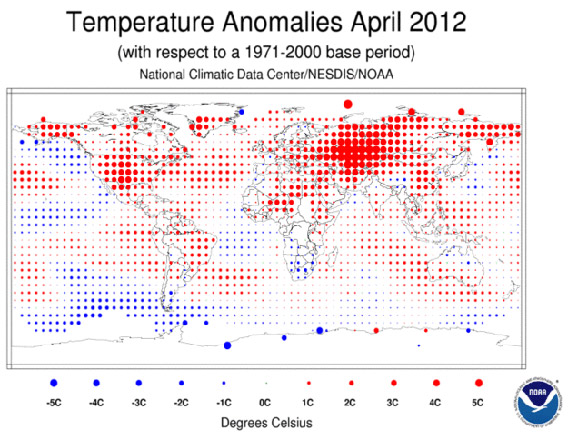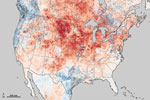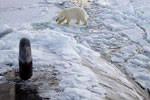
Temperature anomalies in April 2012 with a base period of 1971-2000.
La Nina conditions, which generally bring colder temperatures to many parts of the world, ended last month resulting in the fifth warmest April since record-keeping began, and the hottest April yet in the terrestrial Northern Hemisphere, according to the National Oceanic and Atmospheric Administration (NOAA).
On land, worldwide, it was the second warmest April on record, while the oceans’ experienced the eleventh warmest. Global temperatures were 0.65 degrees Celsius (1.17 degrees Fahrenheit) above the 20th Century average.
While monthly and annual data interest climatologists, the study of global climate change depends on long-term trends. One such trend is that April 2012 marked the 326th month in a row where global temperatures have been above the 20th Century average. One has to go back to February 1985—just after U.S. President Ronald Reagan was sworn in for a second term—to find the last month that was below the average—and then only by 0.01 degrees Celsius (0.02 degrees Fahrenheit). One has to go back even further to find a month in which the oceans recorded temperatures below the 20th Century average: September 1976, just two months before Jimmy Carter won the presidency. To date, the last 427th months have all seen marine temperatures higher than last century’s average.
According to scientists, the world is heating up due to the greenhouse gas emissions produced by burning fossil fuels, destroying forests, and other human impacts. The warmest years to date are generally considered 2005 and 2010, while last year was the warmest La Nina yet recorded. Not surprisingly, the last decade was also the warmest on record. Global temperature records go back to 1880.
Related articles
U.S. undergoes warmest 12 months yet
(05/10/2012) Americans would not be remiss in asking, “is it getting hot in here?” According to new data from the National Oceanic and Atmospheric Administration (NOAA)’s National Climatic Data Center, the last twelve months (from May 2011 through April 2012) were the warmest on record for the lower 48 U.S. states since record keeping began in the late 19th Century.
U.S. suffers warmest March, breaking over 15,000 record temperatures
(04/11/2012) March was the warmest ever recorded in the U.S. with record-keeping going back to 1895, according to new data by the National Oceanic and Atmospheric Administration (NOAA). But the month wasn’t just a record-breaker, it was shockingly aberrant: an extreme heatwave throughout much of the eastern and central U.S. shattered 15,272 day and nighttime records across the U.S. In all March 2012 was 0.5 degrees Fahrenheit above the previous warmest March in 1910, and an astounding 8.6 degrees Fahrenheit above the 20th Century average for March in the U.S.
Oceans heating up for over 100 years
(04/02/2012) In 1872 the HMS Challenger pulled out from Portsmouth, England to begin an unprecedented scientific expedition of the world’s oceans. During its over three year journey the HMS Challenger not only collected thousands of new species and sounded unknown ocean depths, but also took hundreds of temperature readings—data which is now proving invaluable to our understanding of climate change.
“Strong evidence” linking extreme heatwaves, floods, and droughts to climate change
(03/28/2012) As North America recovers from what noted meteorologist Jeff Masters has called “the most incredible spring heatwave in U.S. and Canadian recorded history,” a new paper argues that climate change is playing an important role in a world that appears increasingly pummeled by extreme weather. Published in Nature Climate Change, the paper surveys recent studies of climate change and extreme weather and finds “strong evidence” of a link between a warming world and the frequency and intensity of droughts, floods, and heatwaves—such as the one that turned winter into summer in the U.S.
NASA image: records shattered across U.S. as summer arrives before spring

(03/22/2012) Central U.S. and parts of Canada have seen over a thousand record temperatures shattered over the past week and a half, as an abnormally-long and bizarrely-hot warm spell moves across portions of North America. The direct cause of the weird weather is a blocked high pressure system, but as the U.S. experiences what may be the warmest March on record, meteorologists say climate change may be playing a role in the severity of the heatwave.
2010, not 1998, warmest year on record
(03/20/2012) An updated temperature analysis by the Met Office and the University of East Anglia’s Climatic Research Unit has confirmed that 2010, not 1998, was the warmest year since record keeping began in the late 19th Century. The new analysis adds in temperature data from 400 stations across northern Canada, Russia, and the Arctic, which had been left out of the previous analysis.
Arctic warms to highest level yet as researchers fear tipping points

(02/13/2012) Last year the Arctic, which is warming faster than anywhere else on Earth due to global climate change, experienced its warmest twelve months yet. According to recent data by NASA, average Arctic temperatures in 2011 were 2.28 degrees Celsius (4.1 degrees Fahrenheit) above those recorded from 1951-1980. As the Arctic warms, imperiling its biodiversity and indigenous people, researchers are increasingly concerned that the region will hit climatic tipping points that could severely impact the rest of the world. A recent commentary in Nature Climate Change highlighted a number of tipping points that keep scientists awake at night.













